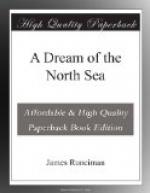country, those toiling sailors were hopeless, loveless,
comfortless, joyless, and—I say it with
awe—heavenless; for scarcely a man of them
had knowledge or expectation of a life wherein the
miseries of this one may be redressed in some far
land where Time is not.” Then the youngster
coldly, gravely told of his surgical work, and it
seemed as if he were drawing an inexorable steel edge
across the nerves of his terrified hearers. He
watched the impression spread, and then sprang at his
peroration with lightning-footed tact. “We
English are like barbarians who have been transferred
from a chilly land to a kind of hot-house existence.
We are too secure; no predatory creature can harm
us, and we cultivate the lordlier and lazier vices.
Our middle class, as Bismarck says, has ’gone
to fat,’ and is too slothful to look for the
miseries of others. The middle-class man, and
even the aristocrat, are both too content to think
of looking beyond their own horizon. And yet we
are good in essentials, and no tale of pity is unheeded—if
only it be called forth loudly enough. Let us
wake our languid rich folk. They suffer from a
surfeit—an apoplexy—of money.
An eager, wakeful, nervous American plutocrat, thinks
nothing of giving a large fortune to endow a hospital
or an institute for some petty Western town. Are
we meaner or more griping than the Americans?
Never. Our men only want to know. Here is
a work for you. I do not call our fishermen stainless;
they are rude, they are stormy in passions, they are
lacking in self-control; but they are worth helping.
It is not fitting that these lost children of civilization
should draw their breath in pain. Help us to heal
their bodies, and maybe you will see a day when their
strength will be your succour, and when their rescued
souls shall be made in a glory of good deeds and manly
righteousness.” There was no mistake about
the effect of this simple speech. I cannot give
the effect of the timbre of Ferrier’s voice,
but his virility, his majestic seriousness, just tinctured
by acuteness, and his thrill of half-restrained passion,
all told heavily.
Slowly the party dispersed to the tents on the lawn,
and many were the languidly curious inquiries made
about the strange young professor who had turned missionary.
The man himself was captured by Lady Glendower, who
explained her woe at the perfidious behaviour of Myung
Yang, the most interesting convert ever seen, who
was now in penal servitude for exercising his imitative
skill on my lady’s signature. “And
I expended a fortune, Mr. Ferrier, on those ungrateful
people. Is it not enough to make one misanthropic?”
“Your ladyship must begin again on a new line.”
“After hearing you, and all about those charmingly
horrid accidents, I am almost tempted to take your
advice.”
Ferrier was invited to address at least a dozen more
drawing-room meetings, and Sir John Rooby grunted,
“Young man! I’m ready to put a set
of engines in that boat of Cassall’s, and you
can have so much the more money for her maintenance.”




